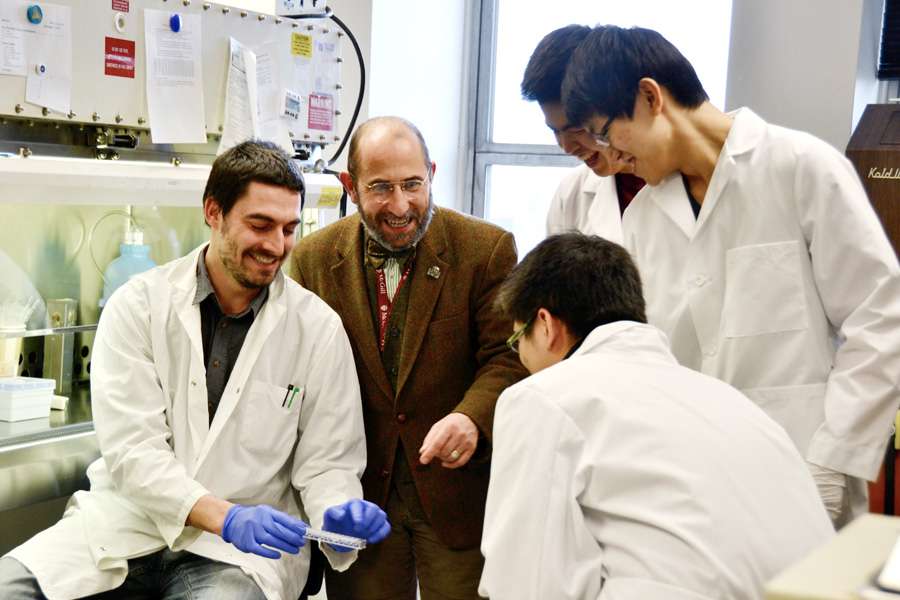Sitting in on an interview with Chair of the Department of Microbiology and Immunology Joaquin Madrenas, it’s easy to be mesmerized by his knowledge, charisma, and aptitude to take on life.
“I feel fortunate; I enjoy everything!” said Madrenas. “[Aside from science, I try to engage in various activities] with my friends and family in an attempt to make sure my life is a continuum.”
One of these activities—music—has shaped both the lectures he gives at McGill and, in June 2012, inspired a Ted Talk about the impact of infectious diseases. In his teaching, Madrenas relates the crescendos and decrescendo, as well as other musical elements of symphonies with the different phases of disease.
Throughout his career, Madrenas has made influential contributions to science through his publications in many top journals. However, his experiences transcend that in research. Madrenas holds a medical degree from the University of Barcelona and is currently an active professor at McGill.
“I think I [always saw myself conducting research], but my primary vocation has always been medicine,” Madrenas said.
“I consider myself a physician that had the opportunity to be confronted with patients’ needs, which [I could] tackle through research. I [hope that at the end of my career] I can say that I have contributed to improving the quality of life of my patients.”
Although he doesn’t practice clinical medicine anymore, Madrenas works very closely with human health through research.
“In the lab, we have two lines of research,” he explained. “Both have in common the discovery of novel ways to regulate immunity. We are looking at how microbes learn to live in humans without causing disease and finding out what mechanisms they use in doing so. Those mechanisms could be [useful in] developing templates for new treatments. [We are also looking] to find out how biological membranes are put together to facilitate communication between the [outer and inner] world of the cell.”

Despite his own research accomplishments, Madrenas now finds gratification from others working in his laboratory. He emphasizes the importance, as a professor and scientist, to change other people’s lives.
“Moments of discovery are tremendously gratifying [and when they come] from one of my students or trainees, they are even more so,” he said. “Seeing your trainee succeed and become successful on his or her own is tremendously rewarding.”
As for what inspires him, Madrenas is a man of values and simple pleasures.
“My family and my wife in particular [are a] constant source of joy and intellectual challenge. My environment is [also a] source of inspiration,” Madrenas said.
He insists that this includes his colleagues and staff at McGill and beyond.
“Figuring out how the things we witness [occur] is also inspirational. I have found it practical to be inspired every day by very little things…. At the end of the day, success is anything that allows you to get a sense of happiness,” Madrenas said. “[It is] an internal sense of happiness, which includes peace, respect and fulfillment. I think happiness is a state of mind, [which] you work on […] One can be very happy while being bored, [just as] one can be happy being challenged,” he said. “At the end of the day, I am a happy person.”
McGill Tribune: What do you look for in students who are applying to work in a laboratory?
Joaquin Madrenas: [It’s] a combination of qualities that projects a positive profile for recruitment, [which] include enthusiasm, drive, intellectual brilliance and past track record of achievement [….] I am always looking for brilliant students or trainees to come to my lab to work in our team, so the need to see a fit in [that framework] is also very important.
MT: What is your biggest fear?
JM: Losing the energy to tackle life, becoming disenchanted with everything I see, and losing my ability to be primed by what surrounds me.
MT: What are you reading right now?
JM: I am reading three books: a biography of Johannes Sebastian Bach, the novel 14, and a book I currently read on the bus on leadership styles.
Full disclosure: Maral Saghaei spent summer 2013 working in Madrenas’ laboratory.









